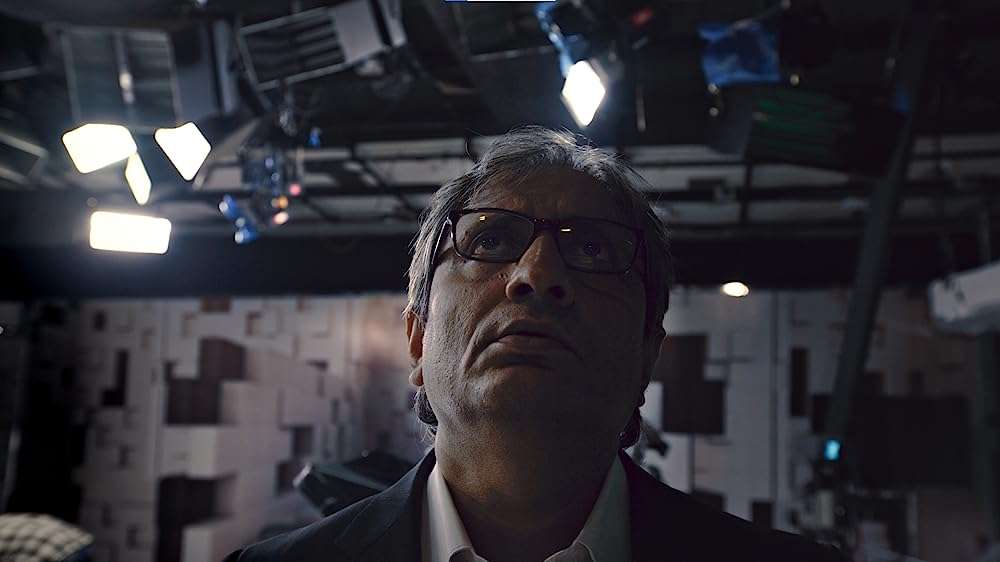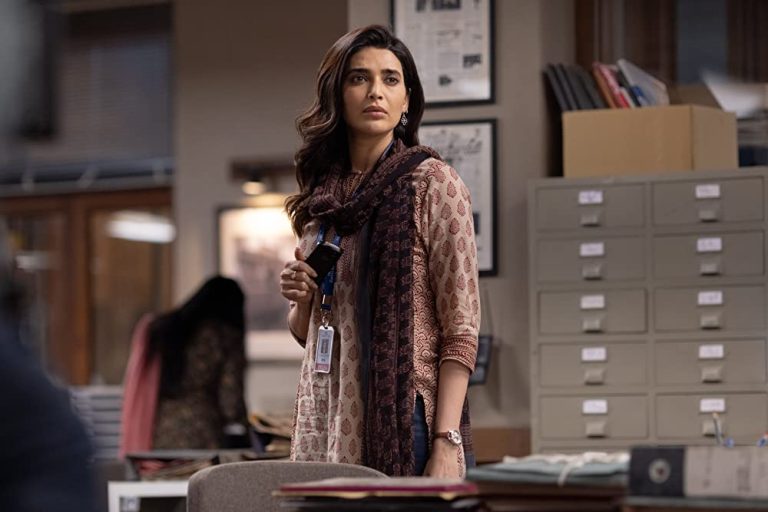Halfway into While We Watched, there is a scene where the central figure, the journalist Ravish Kumar, engages a threatening caller to sing with him, “Saare Jahaan Se Achaa..” The moment smacks as absurd, and, as his wife insists, the call is just getting on his nerves, and he should instantly disconnect. Kumar, however, carries on singing, egging the caller as well. The latter nearly stumped that his intimidation tactics did not exactly pan out as conceived.
Kumar initially tries to make the anonymous caller rationalize his argument but soon realizes its futility. The caller, epitomizing a vast public, is merely busy parroting the words of the deep state faithfully disseminated by mainstream English TV news channels with their cabals of hectoring anchors, which in turn have built and mobilized a vocabulary of divisive rhetoric.
Kumar is obviously no stranger to such calls. He is subjected to a routine barrage of warnings and slurs and all sorts of insinuations drip-fed by vitriolic rival TV anchors onto an audience that simply laps it up without taking any time to discern the truth from the lie. Director Vinay Shukla quickly erects the massive superstructure against which Kumar works in a state of increasing isolation.
The Hindu-Muslim debate, an active, aggressive collusion that serves as a barometer of loyalties to the nation, is placed as the fulcrum on which Shukla draws out the gaping difference between majoritarian opinion and a fast-shrinking alternative space of resistance. Kumar is someone acutely aware of his location and role within history and the future. He understands the staggering power television reportage can wield and the obligation it thereby bears to posterity, successive generations who would refer to the original nodes of fractures in the country’s secular fabric. He takes none of it lightly.
There is a reiteration that such mendacious, vicious, and brazenly agenda-driven reportage would not have such an afterlife as glorious as the patronage it is receiving in the present moment. The film critically foregrounds the cost at which Kumar keeps his unflinching, rather unshakeable, commitment to his professional ideals and ethics intact. The environment within which he operates is one that has conflated journalism and citizenship with jingoism, propaganda shadowing accurate representation, and a rampant paranoia of layoffs.
Kumar’s vulnerability cuts quietly, yet he does not buckle nor compromise, sticking to his position of nearly reprimanding viewers for surrendering and endorsing pernicious narratives harnessed through the nexus of media and government that can only politically recognize and regiment citizens with the ‘us and them’ yardstick. Time and again, he alerts us to carefully read the language of war and doggedly interrogates a privilege of hate above demanding accountability for pervasive unemployment.

There are salary cuts at the organization NDTV, where Kumar works. The newsroom is continually dwindling. Sponsors are backing out as the organization is hailed as one among the, if not the sole, remaining bastion for standing up to the ruling dispensation.
Our entry into the film occurs at a point when Kumar has stopped hosting debates and switched entirely to monologues for the 9 pm primetime slot. The TRPs are dipping, exacerbated by cutbacks on on-ground reporters. Kumar is swiftly depicted as a very accessible figure, responding to and engaging with his viewers, humoring their complaints.
We follow him for over two years, beginning from the 2018 Pune police raids on and arrests of activists, writers, and lawyers, to the lynching of Pehlu Khan, the attack on Umar Khalid, the run-up to the 2019 elections predicated by the Pulwama attacks and the counter-airstrike at Balakot, finally culminating in the conferring of the Ramon Magsaysay award upon Kumar. In between, there are farewells and a cake-cutting that made me a weepy, blubbering mess.
Amaan Shaikh’s camera tails Kumar as he moves from office spaces to home to ground coverage. Shukla weaves in endearing moments between Kumar and his daughter; in contrast, the wife is pretty much slotted as a supportive observer figure, though we intuitively sense flashes of her own resolve.
Shukla, importantly, does not portray the newsroom as a homogenized space of opinion. We perceive the ruptures and fissures in opinion on various sub-points under a larger ideological standpoint and occasionally key primary ideological tiffs too. What is remarkable is there is a mutual acknowledgment and polite conversation, a healthy, respectful back and forth among these discursive departures, instead of enraged shutdowns.
Thoughts of quitting often strike him as he witnesses public hostility grow manifold, his organization assailed by corporate, financial boycotts, railroaded with accusations of financial fraud, systemic and structurally concerted efforts made to impede his reach encompassing wide signal blockages of NDTV on television in crucial moments. He finds his tribe of conscientious reporters diminishing; a desolation drifts with him as he drives around, billboards blaring at him his unpopularity projected by rancorous media houses.
Is nationalism the prerequisite for journalism that is viable? We are repeatedly prodded to ask. Yet for a film haunted by an abiding sense of melancholy, there is also a surge of optimism and the most radical hope, held fiercely by both Kumar and his colleagues and juniors, who choose to stay on in his team, rejecting better-paying offers.
As much as anchors baying for the blood of each dissident public and civilian voice emphasize that the elections are above ideology and solely about one man, PM Narendra Modi, Kumar, and his unit reaffirm the necessity of an ideological sureness that is able to see beyond smokescreens such as triggering national security anxieties to propel electoral strength.
Shukla bolsters this constantly, delineating the ways of seeing that define a viewer, a desensitized moral imperative, rendered hollow by Godi media (this seminal christening by Kumar happens most matter-of-factly), pitted against Kumar’s self-proclaimed old ways of forcing the viewer into an unflattering confrontation with oneself and what one has allowed being perpetuated, condoned and abetted in.
Shuka, reuniting with his An Insignificant Man editor, Abhinav Tyagi, prioritizes a frantic, relentless pace that often leaves us puffing and overwhelmed. The battery of images comes at us with the fusillade-like charge of the anchors railing against the slightest opposition uttered by anyone to the establishment. While this effect cuts to the thick of things, avoiding slack, making for a tense viewing experience, there is also some residue of glibness, especially in the almost paean-like deification of Kumar’s organization, which comes off as a misleadingly simplified touchpoint.
The focus is firmly on the cumulative sense of feeling utterly cornered and abandoned just for staying true to principles, battling out rabid discourse that misguides into flawed understandings of the burden of nationalism. The approach skates dangerously close to being littered in ways that do not allow us to effectively parse the minutiae of the climate of fear Shukla relays. The profusely vigorous, energetic film derives much of its thrust from Joaquin Garcia’s incredible music, which is so enmeshed with the emotional impact the filmmaker seeks to evoke, it occasionally borders on a tad bit overbearing.
This formally dull portrait of a lone ranger needed a far sharper self-critical reflection to articulate the complex socio-political disorientation and private disillusionment its protagonist and his endangered community are tortured. Their anguish strike as programmatic and served to us with a perfectly neat bow tie of a film, the underlying sense of design aiming for a poignant swell and absolute horror overriding nuanced exploration of the myriad debates it spans dizzyingly.
While We Watched screened at the 2023 Sheffield DocFest
While We Watched (2023) Links: IMDb, Sheffield DocFest
Director: Vinay Shukla
Language: Hindi
Runtime: 95 Minutes
Editor: Abhinav Tyagi
Cinematography: Amaan Shaikh






![mother! [2017]: Earth’s Bleeding Heart](https://79468c92.delivery.rocketcdn.me/wp-content/uploads/2018/01/mothercover.0-768x512.jpg)

![Sleep [2020]: ‘Fantasia’ Review – A psychological thriller haunted by a never-ending nightmare](https://79468c92.delivery.rocketcdn.me/wp-content/uploads/2020/08/Sleep-3.jpg)